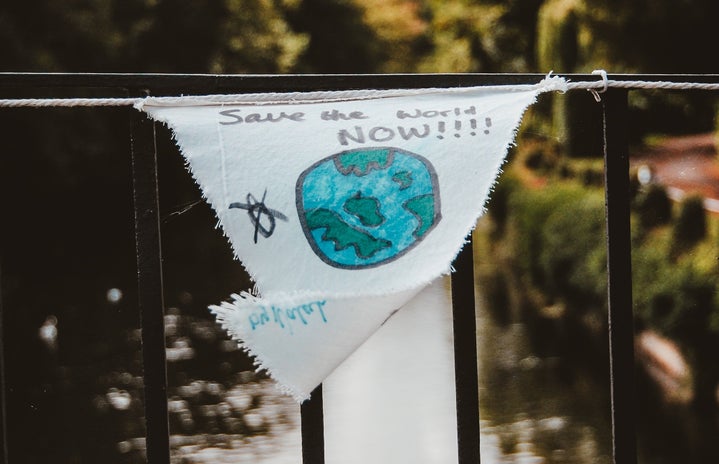Global climate change is the cumulative effect of humans altering the planet and multiplying the greenhouse effect by the addition of carbon dioxide and other gases into the atmosphere. A vast array of data and climate scientists say that our actions can determine the longevity of valuable resources, biodiversity and a stable global climate. NASA points out that the global temperature has risen by almost 2 degrees Fahrenheit since 1880, and NOAA suggests with 95 percent confidence that this year will rank within the top six hottest years on record. In the day-to-day, it’s becoming alarmingly clear that global climate change is here to stay unless our behavior and environmental vices are significantly addressed. Scary, right?
Political action on climate change has repeatedly been put on the back burner, ignored and diluted. This year needs to be different and full of action, policy wins and rapid adoption of an environmentally sustainable public mindset. Climate events and public activism in late 2018 and early 2019 has brought the environmental discussion to the forefront in the United States. Here are the most important points you might have missed:
January 28: Greta Thunberg’s TED talk is made available online
Greta is a 16 year old climate activist that walked out of school last August to protest inactivity on climate change by the Swedish parliament and global leaders. Her actions have reverberated in the global community and encouraged climate strikes in schools across the world. The powerful message of her speech is that hope does not equal action. It parallels to a “thoughts and prayers” criticism and is especially salient because of her age. You can join and learn about the movement #FridaysforFuture here.
February 7: Democrat Rep. Ocasio-Cortez introduces “H.Res.109 – Recognizing the duty of the Federal Government to create a Green New Deal.”
Alexandria Ocasio-Cortez if a House Representative from New York. Her bill proposes to address income inequality and carbon footprint by shifting the economy to renewables and clean energy from fossil fuels. As follows, the bill states that the Green New Deal sets out to secure for all people of the United States and future generations clean air and water, resilience, healthy food, access to nature and a sustainable environment. All of these are good goals, but the bill has been met with reluctance by many Democrats and opposition by Republicans. The proposal indicates new policy efforts and focus from Congress.
March 15: Youth Climate Strikes
A result of the mobilization of youth across the world, 1.6 million showed up and spoke loudly for the planet on all seven continents. To put that in perspective, Fairfax County VA has a population of 1.148 million. There’s still work to be done, but it’s significant because young people are increasingly the voices prompting politicians for action.
March 19: Nebraska flooding (see photos released by NASA)
A historic event due to the severity of the floods, a mix of cold temperatures and storms led to all-time high water levels in Nebraska, Iowa, South Dakota and Wisconsin. More and more weather anomalies are occurring due to climate change in conjunction with regular storm patterns.
What’s Next?
By April, a month often rounded with environmental discussion, the year of 2019 will be one-third of the way through. It’s a great time to be informed of what the global community needs to do and is doing to fight climate change. Big topics right now: plastic pollution in the oceans, the fossil fuel industry and move towards renewables, endangered species conservation. What you can do to participate is be informed and open to change. A lot needs to be done, and that’s okay because the goal is to get everyone to contribute. That means recycling, lowering your carbon footprint, being an informed consumer and, very importantly, keeping climate change in public discussion. Here are some opportunities for activism and awareness:
April 10: Campus Clean Up – GMU Fairfax Campus
Whether you live on or off campus, this event is an opportunity to contribute to the Mason community and on a more macro scale the environment as a whole. Environmental activism and volunteer work is key to understanding the immensity and discretions of human impact.
April 22: Earth Day 2019 and Earth Week at Mason (check out the calendar for April)
In an environmental scientists opinion, every day should be Earth Day. The focus of the holiday is to educate the public on issues and has been annually celebrated since 1970. This year the theme is species conservation.
September 23: United Nations Climate Action Summit
The UN is a conglomerate of world leaders and has made regulations and goals for reducing carbon emissions, such as the Paris Agreement set in 2016 by the United Nations Framework Convention on Climate Change. The summit will focus on action portfolios, adaption and resilience. Discussions can make or break commitments to ending global climate change.
July 4: IUCN Red List Updates
The IUCN Red List is a publication that denotes threat levels for extinction among endangered and otherwise vulnerable species. It is used to assess the state of biodiversity and the need for conservation efforts. Biodiversity is often a clear indicator of environmental health, and climate can have massive impacts on wildlife habitats. For example, a plant species that is the basis of a food pyramid has a shorter growing season, food scarcity results and competition increases, which causes more individuals to die before reproducing.
College students have an important role to play in the discussions on environmental health and climate because unlike the majority of those involved in the youth climate strikes we have the ability to vote and the resources to be committed activists. In April of 2019, think about our relationship with the earth and make the decision to be the activists that future generations need.



